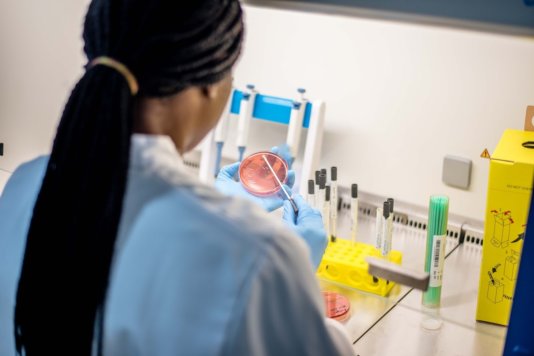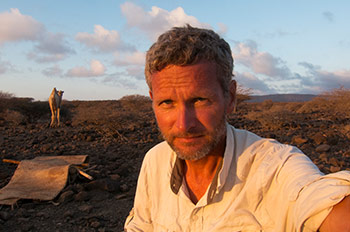- About
- Topics
- Story
- In-Depth
- Picks
- Opinion
- News
- Donate
- Signup for our newsletterOur Editors' Best Picks.Send
Read, Debate: Engage.
| March 04, 2020 | |
|---|---|
| topic: | Health and Sanitation |
| tags: | #Africa, #genetic diversity, #DNA, #health care, #54gene, #Aminu Yakubu, #biobank |
| located: | Nigeria |
| by: | Bob Koigi |
One company in Nigeria is trying to address this. 54gene, a genomics research, services and development company, is utilising human genetic data derived from diverse African populations, to improve the development, availability and efficacy of medical products that will prove beneficial to Africans and the wider global population.
The company’s Vice President of Research Planning and Ethics, Aminu Yakubu talked to FairPlanet about this approach.
FairPlanet: How has the lack of ethnic diversity in human genomic studies affected modern medicine and healthcare, and how does 54gene plan to address this?
Aminu: Africans have the greatest genetic diversity in the world, yet, less than 3 percent of genomic data available comes from people of African descent.
Due to the limited availability of properly consented genetic data from Africans, many new drug and diagnostic products are being made without the inclusion of African data. This results in drugs that are less efficacious for Africans. A clear example is the HIV drug, Efavirenze, which produces terrible side effects in about 25 per cent of Africans who have the CYP2B6 variant.
54gene is on a mission to improve the development, availability and efficacy of medical products that will prove beneficial to Africans and the wider global population. To support our goal, we recently launched the African Centre for Translational Genomics (ACTG), to facilitate translational genomics research by African scientists. The initiative will re-invest in the health ecosystem by empowering the next generation of African genomic scientists through the provision and implementation of grants, fellowships, internships and training for medical researchers, trainees and students. Also, the initiative will facilitate precision medicine across continental Africa.
What is the current status of the project in terms of partnerships with health institutions and collection of blood and tissue samples?
We’re in partnership with over 17 hospitals across states in all six geopolitical zones in Nigeria. Our spread across the geopolitical zones in Nigeria is strategic and will help us as much as possible to ensure representation of the diverse ethnic groups in our studies within the country.
From our research participants, depending on the study that is being implemented, we are collecting blood, tissue and saliva samples. All our research studies are conducted following approval from competent and independent research ethics committees at each of our study sites. Additionally, all our participants are only enrolled into our studies upon given full informed consent.
As a health-tech company innovating homegrown solutions to African problems, what challenges have you faced compared to your peers in other continents?
As with any new innovative solution, people are often unsure what to expect. This uncertainty has been addressed by building a trustworthy relationship with our ecosystem and the larger continent through transparency and open communication. We also want to add Africa to the global genomics innovation map and are actively pursuing that by employing in-continent resources to do so.
What is the perception and reception of patients, hospitals, governments and other stakeholders in the health sector to this initiative?
The reception to 54gene’s work has been quite positive. We’re in partnership with over 17 of the largest hospitals across states in all six geopolitical zones in Nigeria. Governments in these states have been particularly receptive towards our work; in particular, the potential that it holds for translational genomics and precision medicine across the continent.
Being in an area dominated by multinationals who have muscle and resources how have you positioned your business to remain sustainable and compete with the big players?
Healthcare in Africa can be disjointed, but it’s also an incredibly difficult system for a big, foreign company to operate in. It takes a team that understands the nuances of the system, as well as the more sophisticated healthcare market of the US and Europe. We have experience on both sides and we know how to move through the systems in Africa, but also, we understand how to unlock the value outside of Africa. It’s about being able to bridge the gap between two worlds, which I think is where our real niche lies.
What ultimate plans do you have with the biobank and 54 gene?
Ultimately, we want to utilise the genomic data in our biobank at 54gene to improve our collective knowledge of genomic determinants of health and to facilitate translational research.
We hope through our efforts to facilitate translational research and the application of genomics knowledge, new medical products would become available and more impactful on the health of African populations. These medical products would also be more readily accessible to Africans across the globe.
Any additional information?
The ACTG will be funding its first study under the Non-Communicable Diseases - Genetic Heritage Study (NCD-GHS) Consortium. The consortium will see over 100,000 Nigerians participate in the eponymous study which will seek to understand the genetic basis of the prevalent non-Communicable Diseases (NCDs) in Nigeria such as cancers, diabetes, Alzheimer’s, chronic kidney and sickle cell disease, among others.
By copying the embed code below, you agree to adhere to our republishing guidelines.



